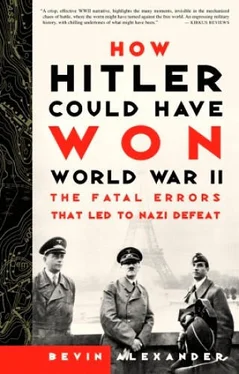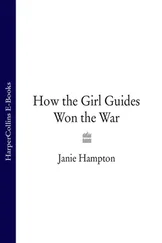The generals were as stunned as the Allies by the speed and success of the campaign. They still could only half believe it was happening. Hitler likewise had become “monstrously nervous.” He hurried to see Rundstedt at Charleroi on May 15 and urged him not to drive toward “boundless shores” ( Uferlose ) .
Rundstedt, also worried, ordered Kleist to stop to give the infantry time to catch up. Kleist reported none of the higher-ups’ worries to Guderian, and simply ordered him to halt. But Guderian, along with the other panzer commanders, saw that a gigantic victory was within their grasp. It could be assured only if they continued to drive west at full fury and not give the distracted and increasingly desperate enemy a chance to develop countermeasures.
Guderian extracted from Kleist authority to continue the advance for another twenty-four hours, under the pretext that “sufficient space be acquired for the infantry corps that were following.” With this permission to “enlarge the bridgehead,” Guderian drove personally to Bouvellemont, twenty-four miles southwest of Sedan. This was the farthest projection of the 1st Panzer Division, and where the 1st Infantry Regiment had been involved in heavy fighting.
In the burning village, Guderian found the infantry exhausted. They had had no real rest since May 9 and were falling asleep in their slit trenches. Guderian explained to Colonel Balck that his regiment had to open a way for the panzers.
Balck went to his officers, who argued against continuing the attack with exhausted troops. “In that case,” Balck told them, “I’ll take the place on my own.” As he moved off to do so, his embarrassed soldiers followed and seized Bouvellement.
This broke the last French point of resistance, and the Germans rushed out into the open plains north of the Somme with no substantial enemy forces ahead of them. By nightfall of May 16, Guderian’s spearheads were at Marle and Dercy, fifty-five miles from Sedan.
Guderian assumed that this spectacular success had stilled the fears back at headquarters, and he sent a message that he intended to continue the pursuit the next day, May 17. Early in the morning, Guderian received a radio flash that Kleist would fly into his airstrip at 7 A.M. Kleist arrived promptly, didn’t even bid Guderian good morning, and launched into a tirade for his disobeying orders. Guderian at once asked to be relieved of his command. Kleist, taken aback, nodded, and told him to turn over command to the next-senior officer.
Guderian radioed Rundstedt’s army group what had happened, and said he was flying back to report. Within minutes, a message came to stay where he was. Colonel General Wilhelm List, 12th Army commander, was coming to clear up the matter. List arrived in a few hours and told Guderian the halt order had come from Rundstedt, and he would not resign. List was in full agreement with Guderian’s desire to keep going, however, and authorized him to make “reconnaissance in force,” a subterfuge that did not defy Rundstedt’s command but slipped around it.
Immensely grateful, Guderian unleashed his panzers, and they surged forward. Rundstedt’s army group belatedly called off its stop order. By nightfall May 17, 10th Panzer seized a bridgehead across the Oise River near Moy, seventy miles west of Sedan. The next day, 2nd Panzer reached St. Quentin, ten miles beyond Moy, while, on May 19, 1st Panzer forced a bridgehead over the Somme near Péronne, almost twenty miles west of St. Quentin.
The velocity of the panzer drive had made a powerful counterstroke almost impossible. Even so, the newly formed French 4th Armored Division under General Charles de Gaulle came forward on May 19 with a few tanks and attacked near Laon, but was severely repulsed. This failure to mass tanks was the pattern the French and British followed throughout the campaign. Even after the breakthrough, they might have stopped the advance if they had concentrated their still formidable armored strength and struck hard at a single point on the German flank.
This never happened. The French had formed four armored divisions of only 150 tanks apiece in the past winter, and had wasted them in isolated engagements like de Gaulle’s attempt at Laon. Most of the 3rd Armored Division had been dispersed among the infantry along the Meuse at Sedan, while the rest had been shattered in small attacks. The 1st had run out of fuel and been overrun by Rommel’s panzers, while the 2nd had been spread along a twenty-five-mile stretch of the Oise, and Guderian’s leading tanks had burst through them with little effort.
In Belgium, the tanks of the ten British armored battalions had been parceled out to the infantry divisions, as had those of the three French mechanized divisions and independent French tank battalions. The few French tanks that had assembled at Gembloux, however, had performed excellently, showing what might have been achieved with concentration.
On May 20, 1st Panzer seized Amiens and pressed southward to form a bridgehead four miles deep across the Somme. During the afternoon, 2nd Panzer reached Abbéville, and that evening a battalion of the division passed through Noyelles and became the first German unit to reach the Atlantic coast. Only ten days after the start of the offensive, the Allied armies had been cut in two.
The Allied forces in Belgium had formed a line along the Scheldt River, with their southern flank resting at Arras, only twenty-five miles from Péronne on the Somme. Thus the Germans had only this narrow gap through which to nourish their panzers and their offensive.
The Allies still had a chance. If they could close this gap, they could isolate the panzers, reunite the armies in Belgium with forces to the south, and bring the German offensive to a halt.
Lord Gort, commander of the British Expeditionary Force (BEF), ordered a counterattack southward from Arras on May 21. He tried to get the French to assist, but they said their forces couldn’t attack until May 22. With Guderian’s panzers already at the English Channel, Lord Gort decided he couldn’t wait and ordered forward two infantry battalions of the 50th Division and the 1st Army Tank Brigade with 58 Mark I Matildas armed only with a single machine gun, and 16 Mark II Matildas armed with a high-velocity two-pounder (40-millimeter) gun. Matildas were slow infantry tanks, but with 75 millimeters of armor, were much more resistant to enemy fire than the lighter-skinned panzers.
The attack got little artillery and no air support.
Rommel’s 7th Panzer Division had arrived south of Arras, and he swung his tanks around northwest of Arras on the morning of May 21. The division’s artillery and infantry were to follow.
The British, not realizing that the German tanks had passed beyond them, formed up west of Arras in the afternoon and attacked southeast, intending to sweep to the Cojeul River, a small tributary to the Scarpe, five miles southeast of the city, and destroy any enemy in the sector.
South and southwest of Arras, the British ran into Rommel’s artillery and infantry, minus their tanks, and began to inflict heavy casualties. The Germans found their 37-millimeter antitank guns were useless against the Matildas. The British tanks penetrated the German infantry front, overran the antitank guns, killed most of the crews, and many of the infantry, and were only stopped by a frantic effort—undertaken by Rommel himself—to form a “gun line” of field artillery and especially high-velocity 88-millimeter antiaircraft guns, which materialized as a devastating new weapon against Allied tanks. The artillery and the “88s” destroyed thirty-six tanks and broke the back of the British attack.
Meanwhile, the panzers turned back on radioed orders from Rommel and arrived on the rear and flank of the British armor and artillery. In a bitter clash of tank on tank, Rommel’s panzer regiment destroyed seven Matildas and six antitank guns, and broke through the enemy position, but lost three Panzer IVs, six Panzer IIIs, and a number of light tanks.
Читать дальше


![Джонатан Димблби - Barbarossa - How Hitler Lost the War [calibre]](/books/385421/dzhonatan-dimblbi-barbarossa-how-hitler-lost-the-w-thumb.webp)









